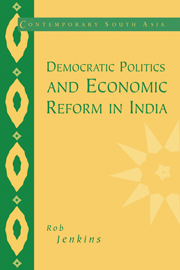Book contents
- Frontmatter
- Contents
- For M.S.J.
- Acknowledgements
- Map: States of the Indian federal union
- 1 Introduction
- 2 The evolution of economic reform in India
- 3 Theoretical and comparative perspectives on the politics of economic reform
- 4 Political incentives: elite perceptions and the calculus of survival
- 5 Political institutions: federalism, informal networks, and the management of dissent
- 6 Political skills: introducing reform by stealth
- 7 Implications
- Bibliography
- Index
4 - Political incentives: elite perceptions and the calculus of survival
Published online by Cambridge University Press: 13 May 2010
- Frontmatter
- Contents
- For M.S.J.
- Acknowledgements
- Map: States of the Indian federal union
- 1 Introduction
- 2 The evolution of economic reform in India
- 3 Theoretical and comparative perspectives on the politics of economic reform
- 4 Political incentives: elite perceptions and the calculus of survival
- 5 Political institutions: federalism, informal networks, and the management of dissent
- 6 Political skills: introducing reform by stealth
- 7 Implications
- Bibliography
- Index
Summary
Why would India's governing elites be willing to continue with reforms which – because they emphasise decision-making by markets instead of politicians – should have them fearing the loss of their political raison d'être? Regardless of the motivation for initiating policy reorientation, what incentives inclined politicians ruling in central and state governments to concentrate, in the main, on managing the political transition which sustainable adjustment demands, rather than battling to halt the reform process itself? These are hugely important questions, since incentives are crucial to any understanding of how democracies are able to cope with the political uncertainties that can undermine the sustainability of economic reform. A prosecuting attorney's first job in a murder trial is to establish the defendant's motive. Similarly, any attempt to build a case for democracy's ability to promote a sustainable reorientation of development strategy must detail the reasons why governing elites are willing to continue reforming once the immediate threat of economic meltdown has subsided.
The objective of this chapter, then, is to advance an argument for the importance of two broad types of incentives. They both proceed from the perspective of governing elites, because it is they who ultimately take the decision of whether or not to abandon reform. Interest groups do not halt adjustment programmes; politicians do. This, of course, is only half of the story, since social groups have influence as well as interests.
- Type
- Chapter
- Information
- Democratic Politics and Economic Reform in India , pp. 83 - 118Publisher: Cambridge University PressPrint publication year: 2000

